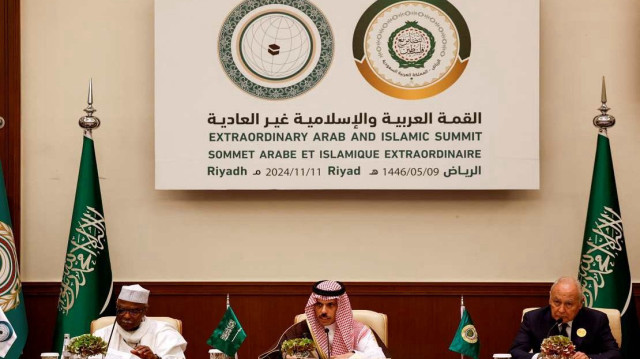
At extraordinary Arab-Islamic summit in Riyadh, Arab leaders, officials call for immediate halt to Israeli military attacks in Gaza, Lebanon, condemning genocide, ongoing aggression
Arab leaders and officials on Monday demanded an immediate end to the genocide Israel is perpetrating against Palestinians in Gaza and its aggression against Lebanon.
Their calls came during speeches by representatives from Kuwait, Bahrain, Oman, Sudan, Mauritania, the Arab League, and the Organization of Islamic Cooperation at an extraordinary Arab-Islamic summit held in the Saudi capital Riyadh.
The summit addressed ways to end Israel's genocide in Gaza and Lebanon, describing the meeting as a continuation of a joint Arab-Islamic summit held in Riyadh last November, according to a statement from the Saudi Foreign Ministry.
- Genocide
Kuwaiti Crown Prince Sheikh Sabah Al-Khaled Al-Sabah condemned Israel's actions in Gaza as a “genocide” and a “systematic targeting of Palestinian lives.”
He emphasized that Israel should not be treated as above international law, warning that “international institutions are now at a crossroads as the genocide continues in Gaza and Lebanon.”
Khalid bin Abdullah Al Khalifa, Bahrain's deputy prime minister, stressed that the prolonged war on Gaza and its expansion into Lebanon had exacerbated tensions and military escalation in the region.
He called on the international community to take decisive action, meet its humanitarian and legal responsibilities, and immediately end hostilities in Gaza and Lebanon to prevent further escalation.
- Dangerous escalation
Omani Foreign Minister Badr bin Hamad Al Busaidi said that the ongoing tragic situation in Palestine and Lebanon had dangerously escalated tensions across the Middle East, threatening regional stability.
True stability in the region can only be achieved through a comprehensive vision based on justice and rights, he said.
Mauritania's President Mohamed Ould Cheikh Ghazouani echoed similar sentiments, criticizing Israel for its continued destruction and genocide in Gaza amid international pressure to stop it.
He added that a cease-fire and efforts to grant the Palestinian people their rightful independence, with East Jerusalem as their capital, are prerequisites for lasting peace and security in the region.
Abdel Fattah al-Burhan, the head of Sudan's Sovereign Council, called for the international community to expedite the implementation of a two-state solution, cease-fire, and prevent further expansion of the conflict, including ending the forced displacement of Gaza's population and ensuring humanitarian aid reaches displaced people.
- International inaction
On the organizational front, Hussein Ibrahim Taha, secretary-general of the Organization of Islamic Cooperation, condemned Israel's “blatant military aggression and genocide” in Palestine and Lebanon, calling for an immediate and comprehensive cease-fire.
Arab League Secretary-General Ahmed Aboul Gheit echoed the sentiment, accusing the international community of failing to prevent Israel's bloodlust, which led the cycle of violence from Gaza to Lebanon, putting the region's stability at grave risk.
He stressed that an immediate cease-fire in both Gaza and Lebanon was essential, with the summit sending a strong message that the danger had reached a level that could no longer be tolerated.
Late last month, Saudi Arabia called for a follow-up joint Arab-Islamic summit to address the continued Israeli assault on Palestinian territories and Lebanon and the worsening situation in the region.
Regional tensions have escalated due to Israel's brutal offensive on the Gaza Strip, which has killed more than 43,000 people, mostly women and children, following a Hamas attack last year.
As the conflict spread to Lebanon with Israel launching deadly strikes across the country, over 3,200 people have been killed and more than 13,800 others injured in Israeli attacks since last year, according to Lebanese health authorities.
Despite international warnings that the Middle East region is on the brink of a regional war, Tel Aviv expanded the conflict on Oct. 1 by launching a ground assault into southern Lebanon.

